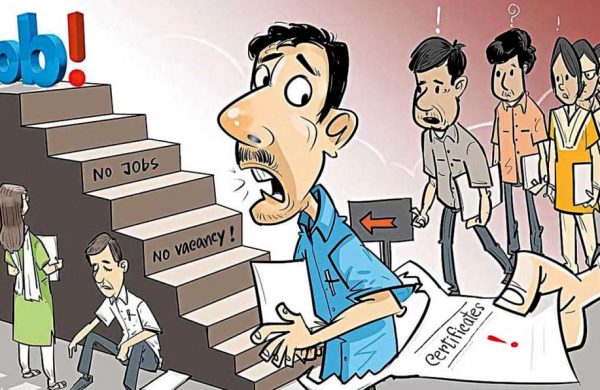Why job creation must come first
- Update Time : Tuesday, May 20, 2025

—Noshin Nawal—
In Bangladesh, the economy grows, flyovers rise, export numbers impress, and yet the average citizen stares blankly at their plate, wondering how to make groceries last the week. It is the great national contradiction: GDP goes up but job security goes down. Economic success stories echo in the halls of power, but the garment workers in the narrow alleys of Mohammadpur, the fresh graduates in Natore, and the rickshaw pullers in Cumilla are all asking the same thing: where are the sustainable jobs?
The truth is, we have perfected the art of looking developed without actually becoming it. Our problems aren’t hard to diagnose. Nearly 20 lakh young people enter the labour force every year, yet formal job creation trails far behind. According to the latest quarterly labour force survey by the Bangladesh Bureau of Statistics (BBS), the unemployment rate has reached 4.63 percent, the highest in recent years. Besides, informal employment makes up over 80 percent of the labour market. Automation, climate migration, lack of upskilling, gender exclusion, and concentration of opportunities in urban areas have made this labour market not just tight, but unjust.
What makes this particularly painful is that Bangladesh is not short of talent, ambition, or work ethic. What it lacks is a system that knows how to convert that into meaningful employment. Instead, we hand out certificates without purpose and diplomas without direction. Across slums and suburbs, young people with degrees are waiting to be useful, watching their potential rot under the pressure of parental expectations, rising food prices, and the suffocating stasis of doing nothing in a country that always claims it’s doing everything.
So, let’s talk about the real story: jobs—not one-off projects, not Facebook training workshops, not the kind of “entrepreneurship” where the youth are told to sell pickles online for “self-reliance,” but actual, living-wage, future-ready jobs. We need a serious national strategy, not sloganeering. And that starts with understanding who needs jobs and what’s stopping them.
For those in the working class—garment workers, domestic workers, small traders—the hurdle is not just low wages, but zero protection. There is no social safety net if they fall ill, no pension, no legal recourse if they’re cheated. These are the hands that run our economy, but they are treated as disposable. Legal reform, minimum wage guarantees, and union protections are not luxuries; they are the foundation of justice in a labour market.
For educated youth, the problem is even more sinister. Years of public money are spent educating them, only for the state to shrug when they graduate. What should they do? Join a political rally in exchange for lunch money? Compete for a public sector job where the recruitment board changes rules mid-exam? Or dream of Dubai while they tutor O Level students to pay their loan instalments?
Meanwhile, rural youth are either forced into unsafe migration or absorbed into unpaid family labour. Climate migrants—those pushed off their land by rising salinity and cyclones—add to the ranks of the jobless in cities already bursting at the seams. Women, especially in conservative and rural settings, are simply not allowed to work or cannot find safe, flexible options. What they all need is a government that listens, and not just before elections.
Recently, Tarique Rahman, acting chairperson of BNP, released a 31-point reform plan that, for all its politics, at least puts jobs where they belong: at the centre. Unemployment allowances for educated youth? About time. Investment in decentralised agro-industries? Necessary. Rebuilding institutions to ensure merit-based recruitment? Revolutionary, if done sincerely. But what’s more important than individual party promises is this: whoever comes to power next must stop treating employment like an afterthought to economic growth. It is the centrepiece that will stabilise the country, combat rising crime rates, and curtail the chaos.
The new government must begin with a national employment guarantee framework, particularly in rural and climate-affected zones. It must invest in large-scale public works that not only create jobs but solve real problems: canals, climate-resilient housing, and rural transport, among others. It must reform vocational education with real world partnerships. It must reward small businesses that hire locally and formalise informal sectors through incentives, not punishment.
In short, we need jobs for all: for the man fixing your tyre in Mirpur, for the woman sewing blouses in Badda, for the graduate with no network in Rajshahi, and for the slum child who just wants to go to school so they can someday work with dignity. These aren’t demands, they are rights. All the reform commissions and their timelines might be resultantly futile if, in the next five years, Bangladesh cannot address the issue of sustainable livelihood.
Without jobs, no amount of infrastructure will save us. What’s the point of a six-lane highway if the only traffic it carries is outbound flights of our brightest minds? What use is a smart city when its residents are too broke to afford broadband internet? A state that cannot provide work is not a prospering state. It is a waiting room for disillusionment.
And when disillusionment reaches its limit, it doesn’t stay quiet. So, before we build another monument, another megaproject, another symbol, let’s do the one thing that truly builds a country: give its people a chance to work, earn, and live with dignity. Otherwise, it’s all flyovers to nowhere.
—————————————————————————————
Barrister Noshin Nawal is an activist, feminist. She can be reached at [email protected].


















